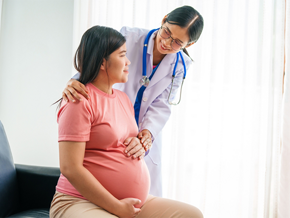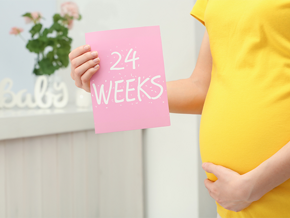
31 Weeks Pregnant: Baby Position, Body Aches, and Wellness Tips
You're 31 weeks pregnant, congratulations! Yes, you're now in your seventh month, and you have nine weeks left before you see your baby, who is now the size of a coconut. As your body prepares for labor, you might feel stronger practice contractions or notice more prominent backaches.
Here’s a breakdown of what’s happening this week, from your baby's development to changes in your body. Plus, discover tips to help you stay comfortable.
Your Baby's Development at 31 Weeks
According to the American College of Obstetricians and Gynecologists (ACOG), your baby has finished most of their major development and is now gaining weight quickly. If you're expecting a boy, his testicles have begun to descend.
Baby’s weight
Your baby may weigh around 1.7 kg or 3.9 lbs. and likely measure up to 42 cm (16.5 inches) in length. They’re also beginning to store body fat so that they can regulate their body temperature after birth, notes the American Academy of Family Physicians.
Baby movement
Your baby can now turn their head from side to side and is becoming more active inside your womb. You may feel kicks and wiggles that may even be strong enough to disrupt your sleep.
Getting into position
Your baby is likely settling into the head-down position to prepare for birth. But don’t panic if they’re not. There's still plenty of time for them to get into place.
Listening and learning
By 31 weeks, your baby's hearing is well-developed, and they can begin to distinguish your voice, making this a great time to talk, read, or play music for them.
Your Body at 31 Weeks Pregnant

Backaches, heartburn, and swollen legs are just some of the discomforts you might feel during your third trimester.
At 31 weeks pregnant, you'll experience symptoms that are your body's way of getting ready for childbirth and motherhood.
Symptoms you might experience
As your baby bump grows, you’ll notice more aches and pains, such as backaches, shortness of breath, heartburn, and swollen feet or ankles.
You may also feel more intense Braxton Hicks contractions. These practice contractions feel like abdominal tightening and help your uterus prepare for labor.
Preparing for breastfeeding
You might also see a thick, yellowish liquid leaking from your breasts known as colostrum or pre-milk, according to the American Pregnancy Association. This nutrient-rich milk your body makes is for your baby. If you do leak, nursing pads can help keep you comfortable.
Changes in discharge
You might notice an increase in vaginal discharge during your third trimester. This thin, milky, and mild-smelling discharge is a regular part of pregnancy that helps prevent infection from reaching your uterus.
Symptoms not to ignore
When you're 31 weeks pregnant, symptoms you shouldn't ignore include:
- Heavy vaginal bleeding or spotting
- A sudden gush or a steady trickle of fluid from your vagina, which could be your water breaking
- Severe or persistent headaches, vision changes, or sudden, severe swelling in your hands, face, or feet, which could be signs of preeclampsia
- A significant decrease in your baby's movements
- Contractions that get closer together, persistent lower back pain, or pelvic pressure that feels like your baby is pushing down (signs of preterm labor)
Contact your healthcare provider immediately if you experience any of these symptoms.
Simple Tips to Help You Stay Healthy

Light exercise, like prenatal yoga, can help ease back pain and improve your mood when you’re 31 weeks pregnant.
These self-care tips can help keep you and your baby comfortable and healthy.
Stay active safely
Many light exercises like prenatal yoga and walking are highly beneficial if you have a healthy, low-risk pregnancy. A 2023 meta-analysis in the Journal of Personalized Medicine found that regular physical activity during pregnancy significantly reduces the intensity of back and pelvic pain.
You can even include light strength training if your doctor allows it. A 2025 systematic review in Acta Obstetricia et Gynecologica Scandinavica found that strength training while pregnant can help improve sleep quality, enhance mood, and reduce back pain.
Eat nutrient-rich food
Continue to eat a balanced diet rich in protein, calcium, iron, and vitamins. These nutrients are vital for your baby’s final growth spurt and for keeping your energy levels up. To ensure you get the right balance, you can follow the Food and Nutrition Research Institute’s (FNRI) Philippine Daily Reference Intakes.
Drink plenty of water to stay hydrated and help prevent constipation and swelling. Need ideas for your plate? Check out these pregnancy meal plan ideas.
Get plenty of rest
Growing a baby is hard work, so getting enough rest is essential! The Sleep Foundation recommends that you sleep on your side during the third trimester. Lie on your left side to improve blood flow to your baby, uterus, and kidneys. Try bending your knees and tucking a pillow between them for better hip and back alignment.
Attend your prenatal checkups
When you're 31 weeks pregnant, your prenatal visit will likely include measuring your belly to track your baby’s growth, checking your blood pressure, and listening to your baby’s heartbeat.
Your doctor might also review your latest lab results, such as your glucose screening if you haven't had one yet, and discuss any symptoms you’re experiencing. This is also a good time to ask about birth plans and hospital preparations.
When you’re 31 weeks pregnant, remember to be kind to yourself. Your body is working hard for you and your baby. Cherish these last few weeks of kicks, rolls, and quiet moments before your precious little one arrives.
Head on over to the ParentTeam Moms and Dads Facebook group and connect with other parents. Ask your questions or share your tips and stories about being 31 weeks pregnant.
References
American College of Obstetricians and Gynecologists (ACOG). "Exercise During Pregnancy." Last reviewed September 2024. Accessed August 12, 2025. https://www.acog.org/womens-health/faqs/exercise-during-pregnancy.
American College of Obstetricians and Gynecologists (ACOG). "How Your Fetus Grows During Pregnancy." Accessed August 12, 2025. https://www.acog.org/womens-health/faqs/how-your-fetus-grows-during-pregnancy.
Cleveland Clinic. "Fetal Development: Stages of Growth." Last reviewed March 19, 2024. Accessed August 12, 2025. https://my.clevelandclinic.org/health/articles/7247-fetal-development-stages-of-growth.
Mayo Clinic. "3rd Trimester Pregnancy: What to Expect." Last modified February 7, 2025. Accessed August 12, 2025. https://www.mayoclinic.org/healthy-lifestyle/pregnancy-week-by-week/in-depth/pregnancy/art-20046767.
MedlinePlus. "Fetal development." Last reviewed August 23, 2023. Accessed August 12, 2025. https://medlineplus.gov/ency/article/002398.htm.
National Health Service (NHS). "Vaginal discharge in pregnancy." Last reviewed April 17, 2024. Accessed August 12, 2025. https://www.nhs.uk/pregnancy/related-conditions/common-symptoms/vaginal-discharge/.




























